Member Blog: Management Science Associates, Inc. Leads Research Initiatives Alongside Vireo Health
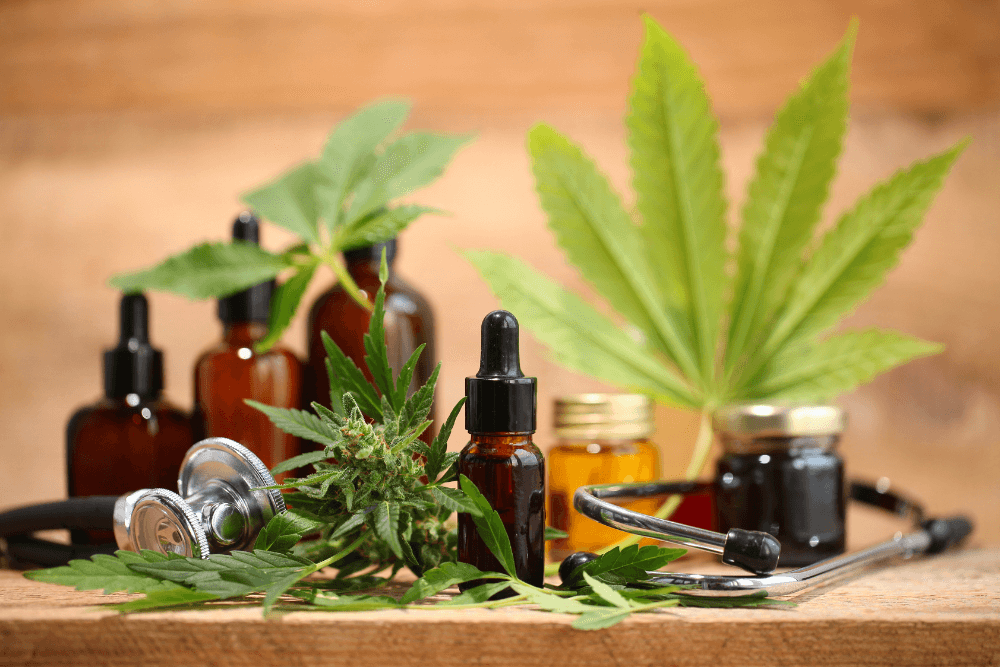
Contributing Authors: Geoff Atkinson, Senior Data Analyst, Management Science Associates, Inc. | Madeline Grant, Business Development Manager, Management Science Associates, Inc. | Paloma Lehfeldt, Director of Medical Education, Vireo Health
One of the promising uses for medical cannabis is treating chronic pain, potentially reducing or replacing prescription opioids and thus reducing the number of overdoses and deaths. Due to the legal status of cannabis and its schedule 1 status on the Controlled Substance Act, there has not been a significant amount of clinical research into its efficacy as a replacement or adjunct therapy for opioids, or its optimal dosing. Unfortunately, due to the lack of research and data there remains uncertainty for patients’ access to pain management and relief through cannabis. The limited research and data availability create uncertainties around patients’ access to cannabis for pain relief. Considering this, Management Science Associates, Inc. (MSA) has taken the initiative to collaborate with cannabis operators such as Vireo Health, aiming to investigate the impact of cannabis consumption on patient health outcomes by utilizing real-world healthcare data. This empirical data is crucial for enhancing our understanding of the complexities surrounding cannabis usage.
MSA and Vireo Health Study
MSA partnered with Vireo Health of Minnesota to complete a first of its kind study for Minnesotan medical patients in the state’s programs. We focused on several hundred customers from eight Vireo dispensaries across Minnesota. Using MSA’s patented de-identification software the data reflected that customers of eight dispensaries in Minnesota reduced their legal opioid usage by an average of 30%. A comprehensive analysis illustrated that these customers, on average, consumed 115 mg of morphine equivalent (MME) per month to their initial cannabis purchase. During the period of cannabis consumption, this figure decreased to 80 MME/month, representing a significant 30% reduction. Notably, opioid prescriptions reverted to higher levels after customers completed their final cannabis purchase. While individual circumstances may necessitate specific medication usage, aggregating data over larger cohort allows for capturing overarching trends.
Once we established, in this particular data set, cannabis may aid in reducing opioid use, we examined additional contributing factors in more detail to determine which patients had the most success. Using MSA’s patented de-identification technology, an individual’s cannabis purchases was matched with their prescription records while maintaining the confidentiality of personal health information. Understanding the connection between cannabis purchasing trends and medical outcomes could be very valuable in making informed decisions about dosing and connecting customers to the products that most effectively meet their particular needs. With the limited clinical research in particular randomized control trials in the United States, there is not nearly as much of this kind of information available for cannabis as there is for more traditional pharmaceuticals. Studies like this are crucial to gather credible data for medical patients to purchase and consume the correct products and dosage.
Continued Results of the MSA and Vireo Health Study
One initial observation is that the impact of cannabis on opioid prescriptions is different for different age groups. Individuals under the age of 45 experienced a 47% decrease in opioid prescriptions, while the 45–64 age group saw an average drop of 35%. Those over the age of 65, who tended to have the highest amount of opioid prescriptions across all three time periods, saw no significant decrease during the time they were purchasing cannabis. There were small differences between men and women. Women used more prescription opioids overall but saw a slightly greater percentage decrease when they began purchasing cannabis.
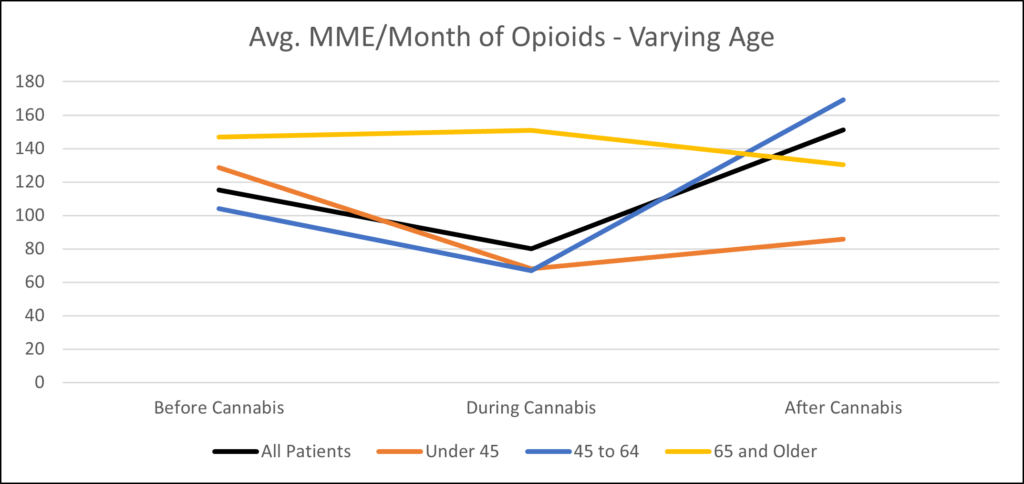
These differences may be related to different demographic groups preferring different forms of cannabis. The table below shows several forms where there were significant differences in percentage of total cannabis spending by age or by gender. For example, younger customers spent more on vape cartridges, and males tended to spend more on flower.
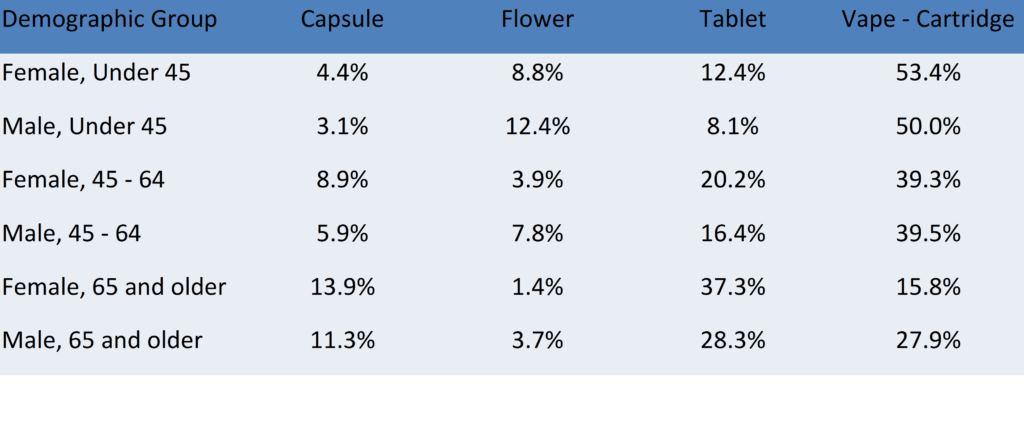
Interestingly, there appears to be no substantial correlation between the total amount of THC purchased and the successful decrease in opioid prescriptions. There was high variation between individuals, but the group of patients who succeeded in reducing their opioid prescriptions purchased an average of 418 mg of THC per month. Those who showed no decrease in opioid prescriptions purchased an average of 563 mg of THC per month. However, those who successfully reduced their opioids did show a preference for products with a high ratio of THC:CBD, spending over 70% of their cannabis budget on products with a ratio of 19:1 or higher.
We also examined the connection between different forms of cannabis and patients’ decrease in opioid prescriptions. One interesting way to divide patients is whether they focused on buying one form of cannabis or sampled many different products to find something that would benefit them. Patients who spent over 60% of their total cannabis budget on one form saw an average decrease of 16% in their opioid prescriptions. Patients who were less focused on one form saw an average decrease of 44%. A conflating factor in this analysis is that customers who purchased many different forms of cannabis also tend to have longer periods of cannabis usage. Customers who tried one or two forms of cannabis averaged 136 days between their first and last purchase. Customers who tried three or four forms of cannabis averaged 342 days. Customers who tried five or more forms of cannabis averaged 833 days.
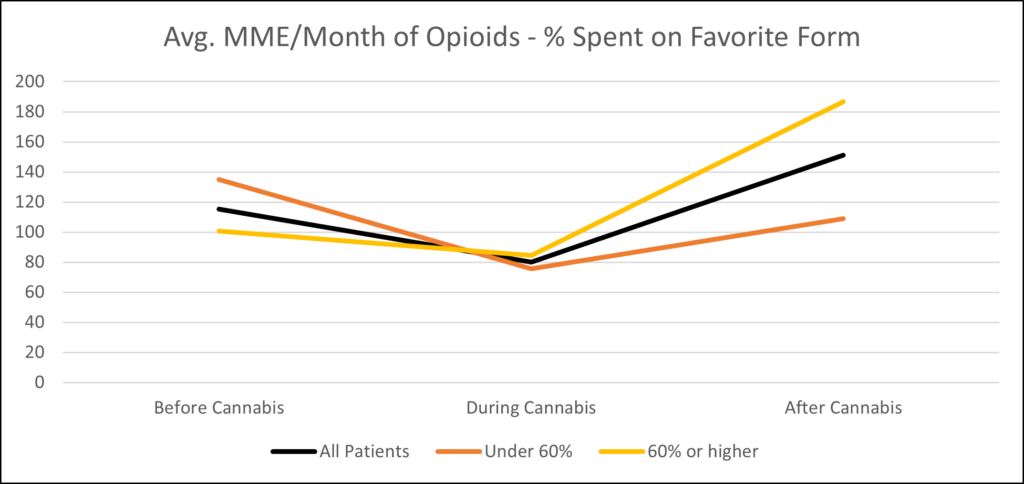
Another way to study the efficacy of particular forms of cannabis is to group patients by their preferred form. For example, customers who spent the majority of their cannabis budget on capsules saw a 63% reduction in opioids while those who preferred tablets saw a 34% decrease. Customers who purchased mostly vape products (the most popular form in these particular dispensaries) saw a 28% decrease, but less rebound towards earlier levels after they stopped purchasing cannabis. Some of these analyses are less statistically significant because of the relatively small number of customers in each group.
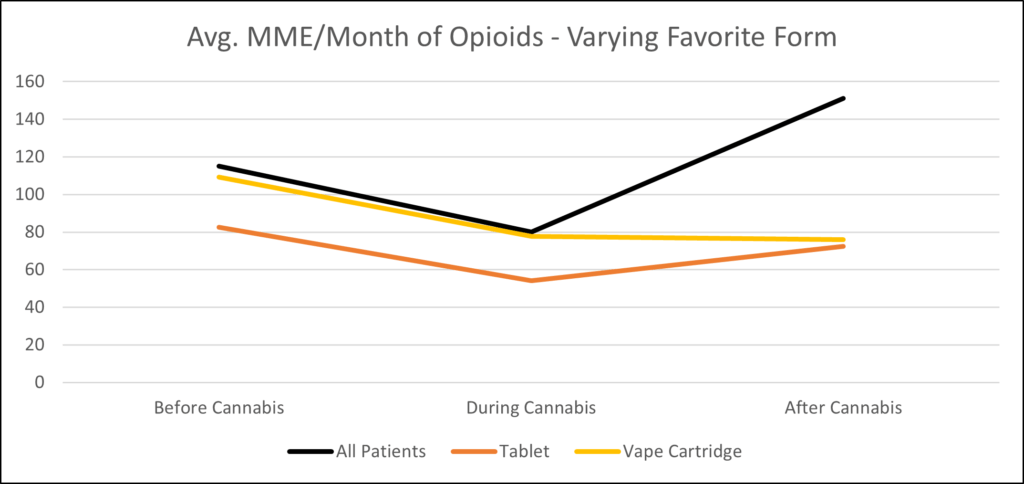
Next Steps
While these preliminary findings are intriguing, they underscore the necessity for further research. MSA will continue to look at cannabis customers across multiple states, where different types of products may be available, which might either reinforce our findings, or illuminate some interesting differences between customers in different markets. Looking at more total customers would increase the significance of the findings relating to customers’ preferred forms of cannabis, which would be very helpful in pointing future customers towards the products most likely to help them. MSA will continue to work with cannabis companies, healthcare professionals, advocates, and policymakers across the United States to conduct studies and continue to share reliable data with the cannabis industry.
If you are interested in learning more or getting involved with MSA by being a prominent leader in medical cannabis research, we’d love to hear from you. You can reach out to Madeline Grant at mgrant@msa.com to schedule an introductory call.
Equity Member Spotlight: Taking Events to the Next Level
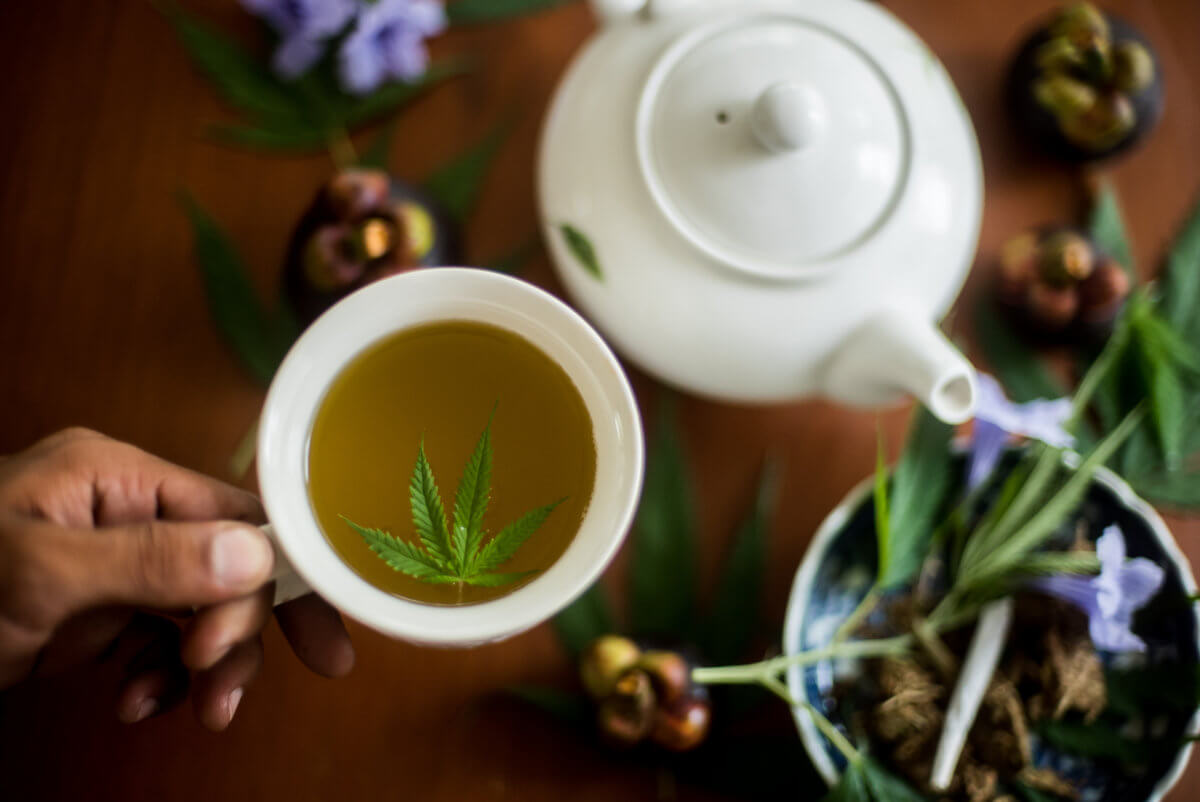
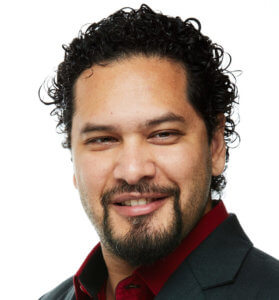 by Mike Lomuto, NCIA’s DEI Manager
by Mike Lomuto, NCIA’s DEI Manager
Events are a major way in which the culture of cannabis is preserved and evolves. With 4/20 upon us, we felt it appropriate for this column – which is all about staying true to the culture – to focus in on some of our members who specialize in innovative cannabis events.
For this celebratory month of 4/20, we’re checking in with:
Michael Webster, Founder & Managing Member of Falling Leaves Events, and new member of NCIA’s Banking & Financial Services Committee
Toni, Founder of Toni Consulting and Wellness, member of both NCIA’s Health Equity Working Group and Education Committee
And the ladies of HUSH
Kay Villamin, Co-Founder and Creative Director, and Chair of NCIA’s State Regulations Committee
Vanessa Valdovinos, Co-Founder and Director of Events, Organizer of NCIA’s Marketing & Advertising Committee
Michael shares his infused fine dining and networking series. Toni spreads wellness through the community with her movement-based events that balance the endocannabinoid system and educate the mind. And Hush brings an innovative and highly professional approach to elevate cannabis experiences through their immersive events.
We asked these three cannabis companies some questions about their events and the mission behind them. The journey is always part of the destination, and in this spotlight we get to hear about how these industry groundbreakers are bringing positive innovations to the culture, transforming it with each event. Read to the end to find out where to catch them next.
What type of events do you throw?
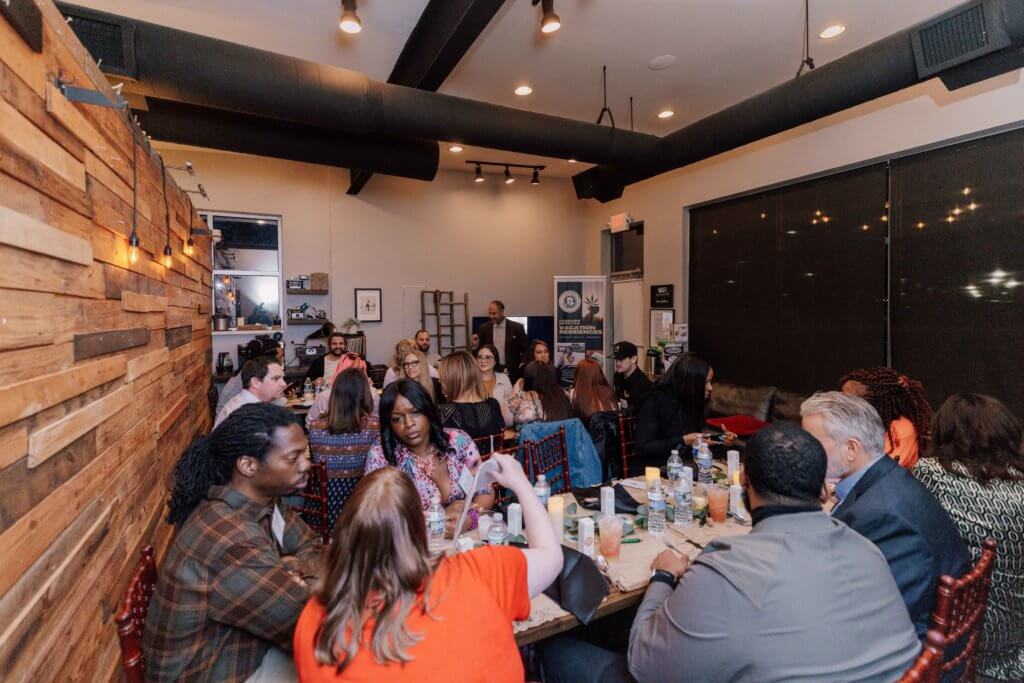
MW: Our offerings have evolved with the Michigan adult-use market. While our early events were consumer-focused, we’ve become much more industry-focused, situating ourselves as a B2B connector in the event space. Our current event series, The Falling Leaves Infused Dinner Series, brings together operators, influencers, stakeholders, and allies of the Michigan cannabis industry for infused networking and fine dining. We are also working on a B2B cannabis industry expo to connect the many brands, cultivators, and processors here in Michigan.
Toni: I offer wellness events in the community that provide education highlighting the numerous wellness benefits and usages of the plant. My events are rooted in creating community awareness and solutions around the necessity of cannabis health equity policies.
HUSH: We host and produce high-level experiential events focused on providing immersive experiences with cannabis through interactive design, entertainment, and customized activations that provide creative ways to engage with the plant. From networking events to large conference afterparties and trade shows, we produce a wide range of experiences for brands in the industry.
What makes your events unique?
MW: In a word – or two – Form Factor. Our choice to offer consumption via infused food and beverages is what truly sets us apart from other consumption events. Our networking component offers the opportunity to connect with other members of the industry, and has become quite an attractive feature. Our events feature a carefully curated guest list of folks targeted by sponsors to be in the room so the deals can get done. We have replicated the diplomatic dinner table, where, traditionally, wars have been averted, treaties signed, and industry deals secured. Instead of the smoky, tobacco-filled back rooms, we’re providing smoky, cannabis-filled rooms that feature equity and transparency.
Toni: I curate events that provide education in a way that helps to destigmatize the plant while highlighting its various wellness benefits and usage options, delivered through storytelling, movement, stillness, creative expression, and reflective practices.
HUSH: Every aspect and layout of our events is intentionally designed with the goals of innovation and impact. Our guest experience is first in mind from beginning to end – from accepting an invitation to when they leave the doors to go home – we think of every detail involved. We think of how we want our guests to feel when they enter and guide them in their entire journey, as well as how they can interact with the brands and sponsors we work with. We attract high-caliber, global majority leaders in the industry from all over the country.
How do you roll your mission and advocacy into your events?

MW: Beyond our core mission of equity in the regulated cannabis industry, championing normative integration of mindful, responsible public cannabis consumption remains our cause celebre. Having, in some ways, been chased from the licensed, regulated consumption event space by burdensome insurance regulations that render Michigan’s cannabis event organizer license effectively unviable, we have pivoted to the private event space as our front in this war against normalization.
We perform a critical role in the Michigan cannabis ecosystem for the benefit of all. Our push for normalization eases pain points up and down the industry supply chain, from municipal hearings considering licensure to breaking stigmas and gaining acceptance from important community organizations intent on preventing harm outside of the supply chain.
Toni: My wellness events are rooted in creating community awareness and solutions around the necessity of cannabis health equity policies.
HUSH: Whether it’s our own hosted event or in collaboration with another brand, our goal is to highlight, serve, and work with fellow BIPOC and social equity brands in the industry. With this intention since inception, we’ve cultivated an audience that believes in the same mission. As part of our mission, we create world-class experiences that bridge the gap between small and big operators to collectively provide environments where we can normalize the consumption of cannabis.
What can sponsors or attendees expect from the experience?
MW: Expectations from our sponsors and guests are high because that’s exactly where we set them. We operate on the more sophisticated end of the cannabis consumption event spectrum. Much like our dear friends over at HUSH Chicago, we seek to deliver an immersive experience that is powered by cannabis but involves much more. Sponsors can expect the highest level of quality engagement possible with attendees. A quote from Chris Hammond, Senior Sales Director at Kairos Labs, LLC, best captures expectations – “This past weekend I went to an event hosted by Michael Webster MSc. The food was amazing, the ambience was perfect, and I got more quality contacts in one night than I have in a week at MJ Biz. Very excited for the next event!”
Toni: Sponsors and attendees can expect to learn about educational needs and ways to support wellness initiatives in communities most affected by the “war on drugs.” My goal is to spread knowledge for the betterment of communities, utilizing the old African proverb; Each One, Teach One.
HUSH: Sponsors and attendees can expect to have all senses engaged when attending a Hush event. Each experience is different from the next as we create new ways to engage our guests. For our sponsors, we think of creative ways to activate their brand while keeping their goals in mind, and measuring metrics that will prove their return on investment. Guests and sponsors alike can expect a stark improvement on what was once considered a cannabis consumption event. Attendees should expect to pull up to the intersection of cannabis consumption and decadence, be greeted by grown folk maturity, and be prompted that it is indeed time to go home after our event, no matter how much they wish to stay.
How has being an NCIA member helped the development of your events?
MW: NCIA membership has been transformational. The ability to tap into a national network of eco-partners from disparate cannabis markets gets us out of our silos. We are influenced by empathy and shared resources. We are nurtured by the collective and dream with the expectation of an eventual common market in which to operate. Our events truly are the manifestation of the old African adage – “if you want to go fast, go alone. If you want to go far, go together.”
Toni: NCIA has helped me identify the need for cannabis education and wellness initiatives in marginalized communities.
HUSH: Being part of NCIA has allowed our company to extend our reach beyond local and regional markets. Being a member of committees has enabled us to build relationships with a national group of leaders in the industry who became supporters and sponsors of our events. We have also received great mentoring and advice from other members.
When and where should we expect to see you in the coming months?

MW: We continue to operate on a monthly cadence in the Metro Detroit area, but we are expanding into other municipalities in Michigan as well. In May we expect to take our show on the road and into the Show Me state. As a brand-new market, Missouri has tons of potential and can benefit from a healthy event market. Check out our website – fallingleavesevents.com – and follow us on social @fallingleavesevents to learn about our upcoming events.
Toni: I have a new offering every other Tuesday in Oakland, CA at Snow Park. I will be leading Community Wellness Yoga where we experience movement for the endocannabinoid system with a live saxophonist.
- April 11th & 25th
- May 9th & 23rd
- June 6 & 20th
You can also catch me on my youtube channel or follow me on instagram @cannabisnursetoni for healthy-infused recipes, movement, and your daily dose of wellness.
HUSH: We are hosting an afterparty for NECANN in Illinois on June 2nd and we are also excited to be working on a large cannabis career conference with 40Tons to take place at Malcolm X College in Chicago on Jun 19, 2023 Lookout for an announcement for a fun event in Q4 when we will be celebrating our 5th year anniversary!







 by Mike Lomuto, NCIA’s DEI Manager
by Mike Lomuto, NCIA’s DEI Manager 

